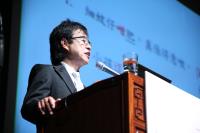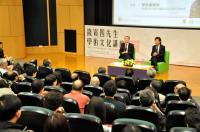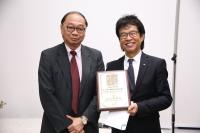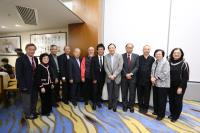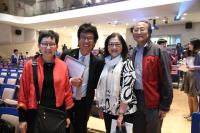
|
|








|






|
| Prof. Hung-nin Samuel Cheung chairs The 29th Ch'ien Mu Lecture in History and Culture | |
|
The "Ch'ien Mu Lecture in History and Culture" is organized to enhance academic and cultural exchanges. Ever since Mr. Ch'ien Mu chaired the first lecture in 1978, it has become a well-respected event within academia, and invited speakers are all distinguished scholars in different fields of Chinese Culture. Since 2013, the lecture series has been endowed by the Mr. Chan Chi-sun Chinese Culture Fund. The College was honored to have Prof. Hung-nin Samuel Cheung, Professor Emeritus of University of California, Berkeley and Emeritus Professor of The Chinese University of Hong Kong, as the guest speaker of The 29th Ch'ien Mu Lecture in History and Culture held in early April 2016. Prof. Cheung delivered three public lectures on his research on Cantonese language during his visit. A banquet in honor of Prof. and Mrs. Cheung was held on 1 April at Yun Chi Hsien, offering our warmest welcome to the speaker. The first talk "Reconstructing Cantonese: Grammatical Changes as Recorded in Early Missionary Texts" was held on 1 April at the Sir Run Run Shaw Hall, CUHK, and was moderated by Prof. Wong Nai-ching, Head of the College. This talk made use of a set of Cantonese language materials prepared mostly by Western missionaries in the 19th century, and focused on how the grammatical changes have occurred. The second talk "What a Map Tells: Language of the 19th Century Hong Kong" was held on 2 April at the Lecture Theatre of the Hong Kong Central Library, with Prof. Tang Sze Wing from the Department of Chinese Language and Literature, as the moderator. This talk focused on the early maps of Hong Kong and reports on findings that betray the linguistic complexity. It also provided both Chinese characters and alphabetic transcription for place names in Hong Kong and its neighboring regions. The third talk "Words and Beyond --- Who is Crying Wolf?" was held on 7 April at Lecture Theatre 1 of Mong Man Wai Building, CUHK, and was moderated by Professor Ho Che-wah from the Department of Chinese Language and Literature. Using a short story by Lu Xun as an example, it focused on the use of words, their twists and turns in the construction of confessions and conversations, and argued the narrator succeeds not so much in writing about the woman in conscientiousness, but rather in writing her out of his consciousness. The three talks received an enthusiastic response and inspired fruitful discussion between the speaker and the audience. |
|
Copyright 2025. New Asia College, The Chinese University of Hong Kong. All Rights Reserved.
This E-Newsletter is solely owned by New Asia College. The College accepts no liability for any loss or damage howsoever arising from
any use or misuse or reliance on any information in this E-Newsletter.






